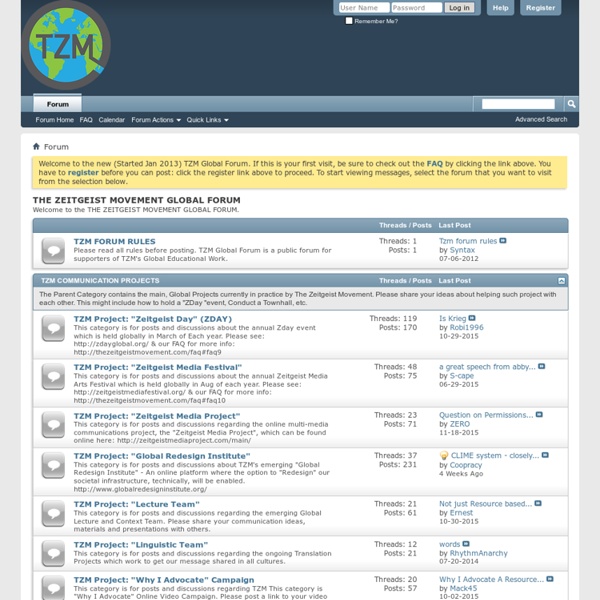



Welcome to the Community Exchange System TZM Frequently Asked Questions (1) What is The Zeitgeist Movement? The Zeitgeist Movement is an explicitly non-violent, global sustainability advocacy group currently working in over 1000 Regional Chapters across 70 countries. The basic structure of The Movement consists of Chapters, Teams, Projects & Events. It is the assumption of The Movement that the educational/activist pressure generated, coupled with what is currently a failing social system, will inhibit and override the established political, commercial and nationalist institutions outright, exposing and resolving the flaws inherent. The transitional goal, once such a global presence and pressure is obtained, is to implement an economic model that follows a truly scientific train of thought with respect to the technical factors that allow for human propensity, public health and environment responsibility over generational time. General Observations: Cyclical Consumption Infinite Growth The Value of Scarcity Problems/Inefficiency = Profit. Terms/Issues covered:
Zeitgeist Movement Activist and Orientation Guide The Zeitgeist Movement is not a political movement. It does not recognize nations, governments, races, religions, creeds or class. Our understandings conclude that these are false, outdated distinctions which are far from positive factors for true collective human growth and potential. While it is important to understand that everything in life is a natural progression, we must also acknowledge the reality that the human species has the ability to drastically slow and paralyze progress, through social structures which are out of date, dogmatic, and hence out of line with nature itself. This movement is about awareness, in avocation of a fluid evolutionary progress, both personal, social, technological and spiritual. While this path does exist, it is unfortunately hindered and not recognized by the great majority of humans, who continue to perpetuate outdated and hence degenerative modes of conduct and association. The movement itself is not a centralized construct.
The Zeitgeist Movement Global TZM - Orientation Download Here The Zeitgeist Movement Defined (Full PDF Book) Who profits? Financial Data to see financial transparency info. About: The Zeitgeist Movement Defined is the official, representative text of the global, non-profit sustainability advocacy organization known as The Zeitgeist Movement (TZM). This tediously sourced and highly detailed work argues for a large-scale change in human culture, specifically in the context of economic practice. However, in the early 21st century, these problems have risen prominently, taking the consequential form of increasing social destabilization and ongoing environmental collapse. While largely misunderstood as being "utopian" or fantasy, this text walks through, step by step, the train of thought and technical industrial reordering needed to update our global society (and its values) to enable these profound new possibilities. If you find a Typo, please email media@thezeitgeistmovement.com (1) Preface Document Structure The Organism of Knowledge About
TZM Events/TownhallsTown Halls events@thezeitgeistmovement.com Overview Formally, TZM has three types of events which are periodic and open to tandem or isolated participation by the community. Our two annual event days, "Zeitgeist Day" and the "Zeitgeist Media Festival" occur in March and August of each year, respectively. These event actions are encouraged for all Chapters of TZM globally to not only communicate new ideas and values, but to also show global unity as a Movement. The other type of common event is the Townhall Style Event. Townhalls The Zeitgeist Movements Townhall Meetings are live, public events conducted by Official Regional Chapters. While annual events such as "ZDAY" and TZM Media Festival are critical annual Chapter events for public awareness in a large scale context, these local, smaller monthly events serve to provide a more grassroots, personal engagement, working to create regional momentum and continued interest. Ideally, these events should be synchronized globally. Space & Format:
Welcome to the Frontpage Zeitgeist Information
Uk Forum seems to be hijacked by Hackers. by londonguy Oct 17